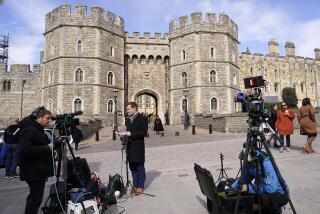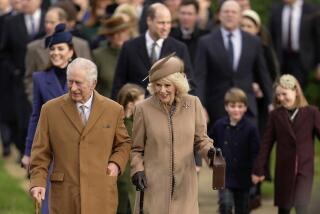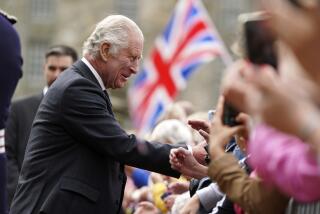New baby prince has a long wait before he becomes Britain’s king
- Share via
The royal baby has arrived and the House of Windsor now has an heir, a spare and a son of a spare. The Britain’s monarchal lineup is pretty much locked in place for the next 100 years.
Yes, tragedy or the unexpected may intrude. No one foresaw the untimely death of Princess Diana in 1997 or the abdication of King Edward VIII in 1936. But chances are that Queen Elizabeth II will be followed to the throne by her son Charles and he will be followed by his son William who will be succeeded by his son (name yet to be announced).
There is also the likelihood that, for at least the next century, the monarch will be an old person. Charles, the Prince of Wales, is already 64. His mother, who has been on the throne for 61 years, is 87 and still going strong. Her mother lived to be 101. If Elizabeth were to match her mum’s longevity, Charles would not become king until he is 78.
In times of yore, kings tended not to last long. They died in war. They died when usurpers took away the throne. They died of disease. Elizabeth’s father, King George VI, died in his sleep when he was just 56 years old. However, monarchs do not die in battle any more and modern medicine keeps kings, queens and all the rest of us alive far longer than in the disease-ridden past.
Elizabeth was just 25 when she became queen in 1952. If any of those who follow her take the throne even at twice that age, it will be a surprise. William, at 31, is likely to have a long time to wait, even if his father only lasts to 90. And the new baby? Look for him to become king somewhere around 2078 at the earliest.
Of course it is quite possible that Charles or William might change the rules and follow the recent examples of Pope Benedict XII and Queen Beatrix of the Netherlands. The pope and the Dutch queen both decided there was no good reason to hang on to the bitter end and simply retired from their jobs. Such a concession to the facts of modern life would speed things along for the newborn prince.
One thing that is far less likely to happen is for Britain to become a republic. There have been rumblings about dispensing with the monarchy for centuries, but the country could not afford it. The royal family may not count for much in politics and governance, but it counts for a great deal for tourists visiting Britain. Getting rid of the Windsors would be akin to Americans deporting all Oscar-winning actors and burning down Disneyland.
No matter how doddering the elderly kings to come may prove to be, the British public and tourism industry will continue to cheer, “Long live the king!”
More to Read
A cure for the common opinion
Get thought-provoking perspectives with our weekly newsletter.
You may occasionally receive promotional content from the Los Angeles Times.










